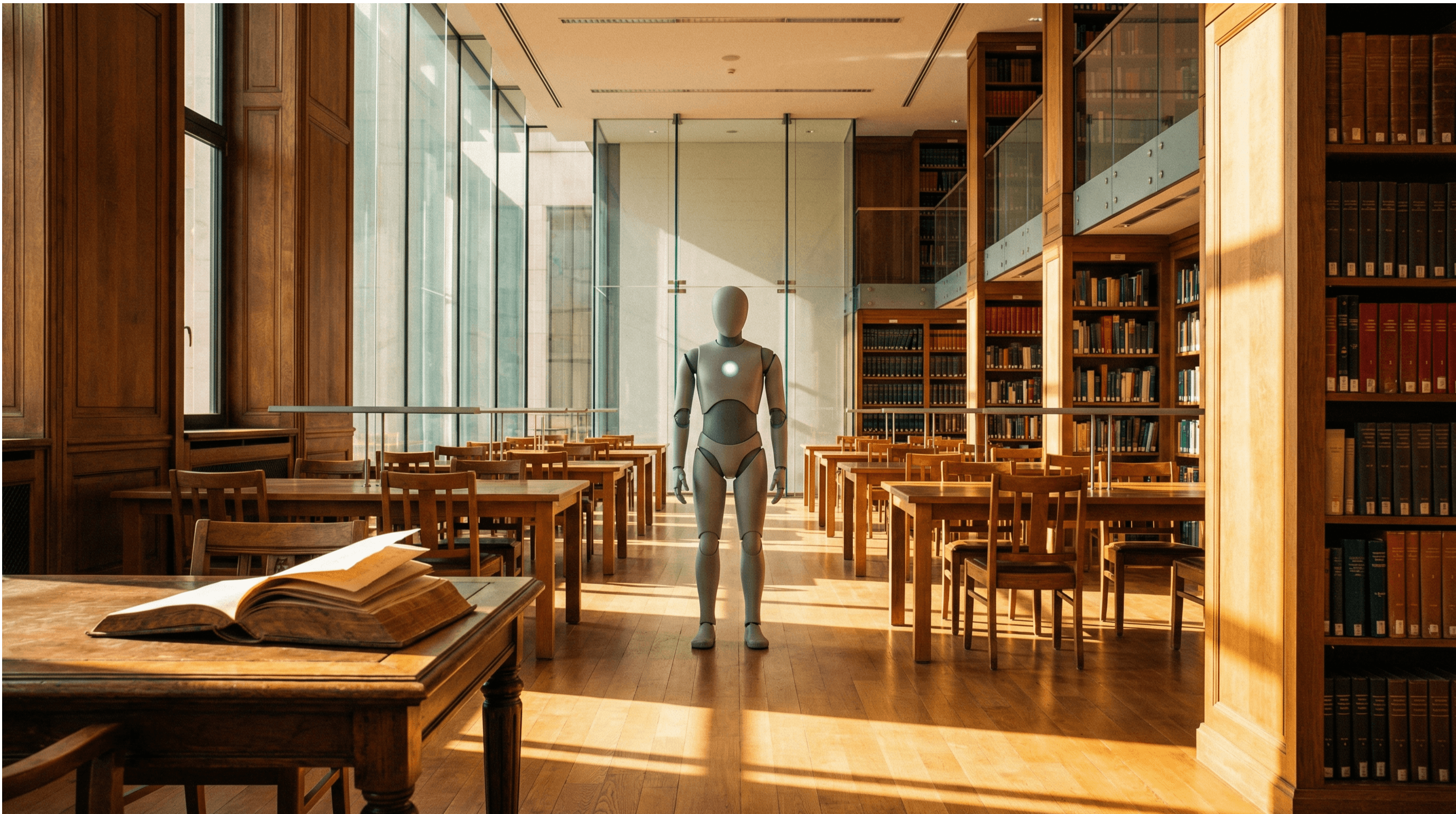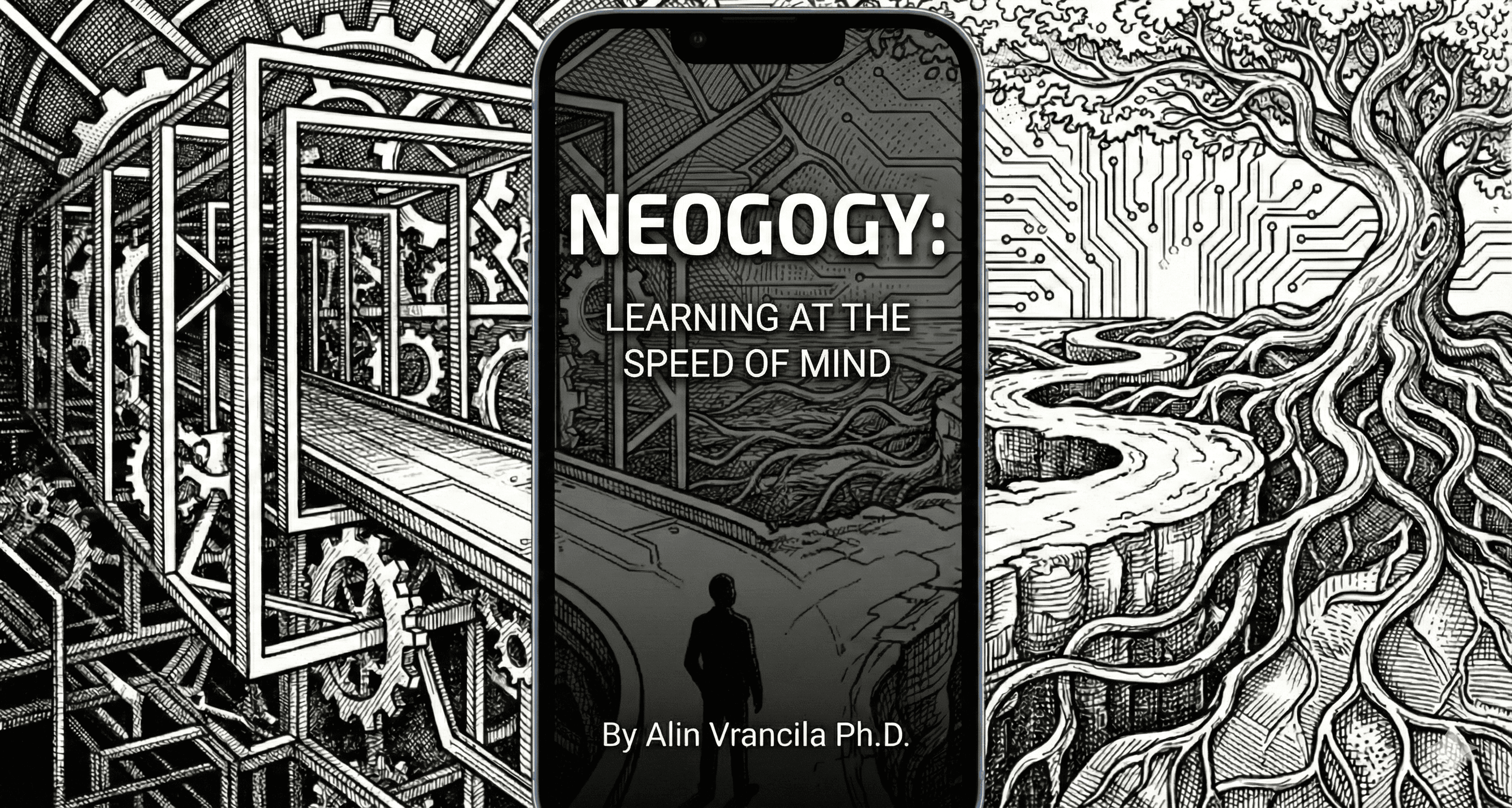Learning to Fly: How Neogogy Can Save Human Thinking
Part 5 of 5: The AI Learning Revolution Series
Standing at the edge of a cliff, you have two choices: step back to safety or learn to fly.
Over the past four posts, I have depicted humanity's precarious position. We've seen the hollow feeling that comes from AI dependency, the shocking brain science that reveals what's really happening when we use these tools, the cognitive capabilities we're losing, and the institutional crisis unfolding in our schools and workplaces.
We can retreat from AI tools entirely, abandoning their potential benefits out of fear of their cognitive costs. Or we can learn to navigate this new landscape in ways that preserve and enhance human cognitive capabilities while harnessing the power of artificial intelligence.
I believe we must choose to fly.
The research has shown us the problem. Now I want to share the solution, a framework that can help us preserve what makes us uniquely human while leveraging the incredible potential of AI tools. It's called neogogy, and it might just be the key to saving human thinking in the age of artificial intelligence.
What Is Neogogy?
The word "neogogy" comes from the Greek "neo," meaning new, and "gogy," meaning leading or guiding, literally, "a new way of guiding." But neogogy is more than just a new term; it represents a fundamental reimagining of how we approach learning and human development in an age where artificial intelligence is reshaping the cognitive landscape.
Neogogy is what researchers at neogogy.ai describe as "an innovative, AI-powered, adaptive learning framework designed for the modern learner, personalized, flexible, and collaborative." But as I've delved deeper into their research and connected it with the cognitive science findings I've shared throughout this series, I've come to understand that neogogy represents something much more profound.
It's a response to the inadequacies of traditional educational frameworks in the face of rapid technological advancement and the ubiquitous presence of AI tools in learning environments. It acknowledges what the research has made painfully clear: that traditional pedagogy, developed for a world without AI, is not just inadequate for our current reality, it may be actively harmful when applied without consideration of AI's cognitive impacts.
The Theoretical Foundation: Building on Giants
Neogogy doesn't reject everything that came before. Instead, it synthesizes the best insights from three established educational approaches while addressing their limitations in the AI age.
From pedagogy, it takes the structured approach to knowledge transmission and skill development. From andragogy, it incorporates the recognition that learners bring experience and motivation that should shape their educational journey. From heutagogy, it embraces the importance of self-directed learning and the development of autonomous learners.
But neogogy goes beyond simply combining these approaches. It synthesizes them within a framework that explicitly accounts for the cognitive implications of AI tools and the unique challenges of learning in a world where artificial intelligence can handle many tasks that once required human thinking.
The framework draws on constructivism, recognizing that learners actively construct knowledge through experience and reflection. But it adapts constructivist principles to account for the fact that AI tools can either support or undermine this knowledge construction process depending on how they're used.
Neogogy incorporates social cognitive theory, emphasizing the importance of learning within social contexts through observation, modeling, and interactions. But it extends this theory to include AI systems as participants in the learning environment, requiring new frameworks for understanding how human-AI interaction affects learning and development.
The Core Principles: A New Framework for Learning
The principles of neogogy directly address the problems revealed by the research I've shared throughout this series.
Flexibility recognizes that learning in the AI age must be adaptive, responsive to individual needs and technological change. Unlike traditional one-size-fits-all approaches, neogogy creates adaptive learning paths that adjust to individual cognitive development and the evolving landscape of AI capabilities. This flexibility is crucial because the pace of AI development means that static educational approaches quickly become obsolete.
Integration acknowledges that AI tools are not going away and that the solution is not to ban them but to integrate them thoughtfully into learning processes. This integration is guided by an understanding of AI's cognitive impacts and a commitment to preserving and developing human thinking capabilities. Rather than using AI as a replacement for human cognition, neogogy positions AI as a tool that can enhance human cognitive development when used appropriately.
Collaboration recognizes that learning in the AI age requires meaningful interactions between learners, educators, and AI systems. This isn't just about using AI tools collaboratively, but about creating learning environments where human-to-human interaction remains central while AI provides personalized scaffolding and support.
Outcome Orientation ensures that educational activities are designed to develop genuine human capabilities rather than simply complete tasks efficiently. This means focusing on cognitive development, critical thinking, creativity, and other uniquely human skills that remain essential even as AI capabilities expand.
Affordability addresses the equity concerns raised by the research. Neogogy seeks to make quality education accessible to all learners, recognizing that AI tools can either democratize access to high-quality learning or exacerbate existing inequalities depending on how they're implemented.
How Neogogy Addresses the Cognitive Crisis
Remember the hollow feeling I described in the first post? The brain changes documented in the second? The cognitive losses explored in the third? The institutional crisis revealed in the fourth? Neogogy provides specific frameworks for addressing each of these challenges.
For the hollow feeling and cognitive debt, neogogy emphasizes the development of metacognitive awareness, the ability to monitor and regulate one's own thinking processes. Students in a neogogy framework learn not just subject matter content, but how to think about their own thinking, how to assess the impact of AI tools on their cognitive engagement, and how to make thoughtful decisions about when and how to use AI assistance.
For the brain changes and progressive neural degradation, neogogy provides frameworks for maintaining cognitive engagement even when using AI tools. Rather than allowing AI to replace human thinking, neogogy uses AI to provide personalized scaffolding that supports cognitive development. This means using AI to present appropriate challenges, provide timely feedback, and adapt learning experiences to individual needs while ensuring that learners engage in the cognitive work necessary for skill development.
For the cognitive losses, memory formation, critical thinking, creativity, neogogy explicitly designs learning experiences to develop and maintain these capabilities. The framework recognizes that different types of AI assistance have different cognitive implications and provides guidance for making appropriate choices based on learning objectives.
For the institutional crisis, neogogy provides comprehensive frameworks for policy development, assessment, and teacher training. It helps institutions clarify their purpose and identity in the AI age, positioning cognitive development as the primary goal of education.
AI-Enhanced Learning That Actually Enhances
What makes neogogy particularly powerful is its approach to AI integration. Rather than using AI to replace human thinking, neogogy uses AI to enhance human cognitive development in several key ways.
Personalized Scaffolding: AI adapts support based on individual learning needs and progress, providing just enough assistance to enable learners to tackle challenging problems without doing the cognitive work for them. This is like having a tutor who knows exactly when to provide a hint and when to let you struggle productively.
Immediate Feedback: Real-time response to learner inputs accelerates improvement, but within a framework that ensures this feedback supports rather than replaces human reflection and self-assessment. The AI provides information about performance, but learners must still engage in the cognitive work of understanding and applying that feedback.
Adaptive Content: Materials adjust to learning style and comprehension level, but in ways that gradually increase cognitive demands rather than reducing them. The AI ensures that learners are always working at the edge of their capabilities, promoting growth rather than dependency.
Collaborative Learning: AI facilitates peer interactions and group problem-solving, but within structures that preserve the human elements of collaboration that are essential for social and emotional development.
Practical Applications: What Neogogy Looks Like in Action
Let me give you some concrete examples of how neogogy works in practice, because the framework is only as good as its implementation.
In a neogogy-informed writing class, students might use AI tools to help with research and initial brainstorming, but only after they've engaged in independent thinking about their topic. The AI provides information and perspectives, but students must synthesize this information with their own ideas and experiences. Assessment focuses not just on the final product, but on the thinking process, students must be able to explain their reasoning, defend their arguments, and engage meaningfully with their own work.
In a neogogy-informed mathematics course, AI tools might be used to check calculations or provide alternative explanations of concepts, but students must still work through problems independently and understand the underlying principles. The AI serves as a sophisticated calculator or tutor, but the cognitive work of understanding mathematical relationships and developing problem-solving strategies remains with the student.
In a neogogy-informed workplace training program, AI tools might be used to provide personalized learning paths and immediate feedback, but employees must still develop independent expertise and decision-making capabilities. The AI enhances the learning process, but the goal is always to develop human capabilities that can function independently when needed.
The Metacognitive Revolution
Perhaps the most important aspect of neogogy is its emphasis on metacognitive development, teaching people to think about their own thinking. This is crucial because the research has shown that people are remarkably poor judges of AI's impact on their cognitive capabilities.
Neogogy explicitly teaches learners to recognize the difference between thinking and consuming AI-generated thoughts. It helps them understand when they're engaging in cognitive work and when they're outsourcing that work to AI systems. It develops sensitivity to the difference between genuine understanding and the illusion of comprehension that AI tools can create.
This metacognitive awareness is essential for making thoughtful decisions about AI use. Without it, people will continue to fall into the cognitive debt trap, feeling productive while actually becoming less capable.
Building Cognitive Resilience
Neogogy also emphasizes the development of what I call "cognitive resilience", the ability to maintain and develop thinking capabilities even in environments where AI tools are ubiquitous. This includes skills like sustained attention, deep reasoning, creative problem-solving, and critical analysis that may atrophy without explicit cultivation.
Cognitive resilience isn't about rejecting AI tools, but about maintaining the ability to think independently when needed. It's about preserving the cognitive capabilities that make us uniquely human while learning to collaborate effectively with artificial intelligence.
The Moral Imperative
The framework recognizes that the preservation and development of human cognitive capabilities is not just an educational goal, it's a moral imperative. The capabilities that are being eroded by inappropriate AI use are fundamental to human agency, democratic participation, and the ability to navigate an increasingly complex world.
Neogogy treats cognitive development as a human right, not just a nice-to-have educational outcome. It recognizes that in a world where AI capabilities continue to expand, the skills that will remain uniquely valuable are those that are distinctly human, creativity, critical thinking, emotional intelligence, ethical reasoning, and the ability to navigate complexity and ambiguity.
What This Means for You
Whether you're a student, educator, professional, or simply someone trying to navigate the AI age thoughtfully, neogogy offers practical frameworks for preserving and developing your cognitive capabilities while leveraging the benefits of AI tools.
For students, neogogy provides guidance for using AI tools in ways that enhance rather than replace learning. It teaches you to recognize when you're thinking versus when you're consuming AI-generated thoughts. It helps you develop the metacognitive skills necessary to make thoughtful decisions about AI use.
For educators, neogogy provides comprehensive frameworks for integrating AI tools into learning experiences while prioritizing cognitive development. It offers assessment methods that can distinguish between genuine student capability and AI-assisted performance. It provides guidance for developing policies and practices that harness AI's benefits while protecting human cognitive capabilities.
For professionals, neogogy offers frameworks for maintaining expertise and decision-making capabilities in AI-augmented work environments. It helps you understand when AI assistance enhances your capabilities and when it might be undermining them.
For institutions, neogogy provides comprehensive approaches to AI integration that prioritize long-term human development over short-term efficiency gains. It helps organizations develop policies and practices that preserve and develop human capabilities while leveraging AI benefits.
The Choice Before Us
The research I've shared throughout this series has shown us that we're at a critical juncture. The decisions we make today about how to integrate AI tools into our learning and work will shape the cognitive capabilities of future generations.
We can continue on our current path, allowing market forces and user preferences to drive AI adoption without adequate consideration of cognitive consequences. This path leads to the systematic erosion of human thinking capabilities, the homogenization of thought, and the creation of a cognitively dependent society.
Or we can choose a different path, one guided by frameworks like neogogy that prioritize human cognitive development while thoughtfully leveraging AI capabilities. This path leads to a future where AI enhances rather than replaces human thinking, where technology serves human flourishing rather than undermining it.
The choice is ours, but the window for making it thoughtfully may be closing. Every day that passes without better frameworks for AI integration, more students become cognitively dependent, more professionals lose essential skills, more institutions struggle with challenges they're not equipped to address.
The Call to Action
I refuse to accept a future where human thinking becomes obsolete, where cognitive capability is sacrificed for convenience, where the tools designed to serve us instead diminish us. I believe we can do better. I believe we can create a future where AI enhances human capability rather than replacing it, where technology serves human flourishing rather than undermining it.
But that future won't create itself. It requires each of us to make different choices about how we engage with AI tools. It requires educators to prioritize cognitive development over task completion. It requires institutions to invest in frameworks that preserve human capability. It requires policymakers to consider the long-term implications of AI integration. It requires all of us to value thinking as a capability to be developed rather than inefficiency to be eliminated.
The research has given us the knowledge we need to make these choices wisely. The framework of neogogy has given us principles for implementing them effectively. What we need now is the courage to act on what we know, even when it means choosing the harder path of cognitive development over the easier path of AI dependency.
Neogogy isn't just an educational framework, it's a vision for preserving and enhancing human cognitive capabilities in the age of artificial intelligence. It's a roadmap for learning to fly rather than fall, for dancing with AI rather than being led by it, for remaining the authors of our own thoughts even as we collaborate with increasingly sophisticated machines.
The future of human thinking is not predetermined. It's being written right now, in classrooms and offices, in policy meetings and personal decisions, in the countless moments when we choose between convenience and capability, between efficiency and understanding, between artificial intelligence and human wisdom.
I invite you to join me in writing a different story, one where we learn to fly rather than fall, where we preserve and develop the cognitive capabilities that make us human while harnessing the power of artificial intelligence to create a future worthy of our highest aspirations.
The choice is before us. The framework exists. The time to act is now.
To learn more about neogogy and how you can be part of this cognitive revolution, visit neogogy.ai and explore their research on learning at the speed of mind in the age of artificial intelligence.
The future of human thinking depends on the choices we make today. Let's choose wisely.
References:
[1] Kosmyna, N., Hauptmann, E., Yuan, Y. T., Situ, J., Liao, X. H., Beresnitzky, A. V., Braunstein, I., & Maes, P. (2025). Your Brain on ChatGPT: Accumulation of Cognitive Debt when Using an AI Assistant for Essay Writing Task. arXiv preprint arXiv:2506.08872.
[2] Becker, J., Rush, N., Barnes, E., & Rein, D. (2025). Measuring the Impact of Early-2025 AI on Experienced Open-Source Developer Productivity. arXiv preprint arXiv:2507.09089.
[3] Zhang, D., Wijaya, T. T., Wang, Y., Su, M., Li, X., & Damayanti, N. W. (2025). Exploring the relationship between AI literacy, AI trust, AI dependency, and 21st century skills in preservice mathematics teachers. Scientific Reports, 15.
[4] Lee, H. P., Sarkar, A., Tankelevitch, L., Drosos, I., Rintel, S., Banks, R., & Wilson, N. (2025). The Impact of Generative AI on Critical Thinking: Self-Reported Reductions in Cognitive Effort and Confidence Effects From a Survey of Knowledge Workers. Microsoft Research.
[5] Attewell, S. (2025, May 21). Student Perceptions of AI 2025. National Centre for AI.
This concludes "The AI Learning Revolution" series. Thank you for joining me on this journey through the research that's reshaping how we think about AI, learning, and human cognitive development. The conversation doesn't end here, it's just beginning.





